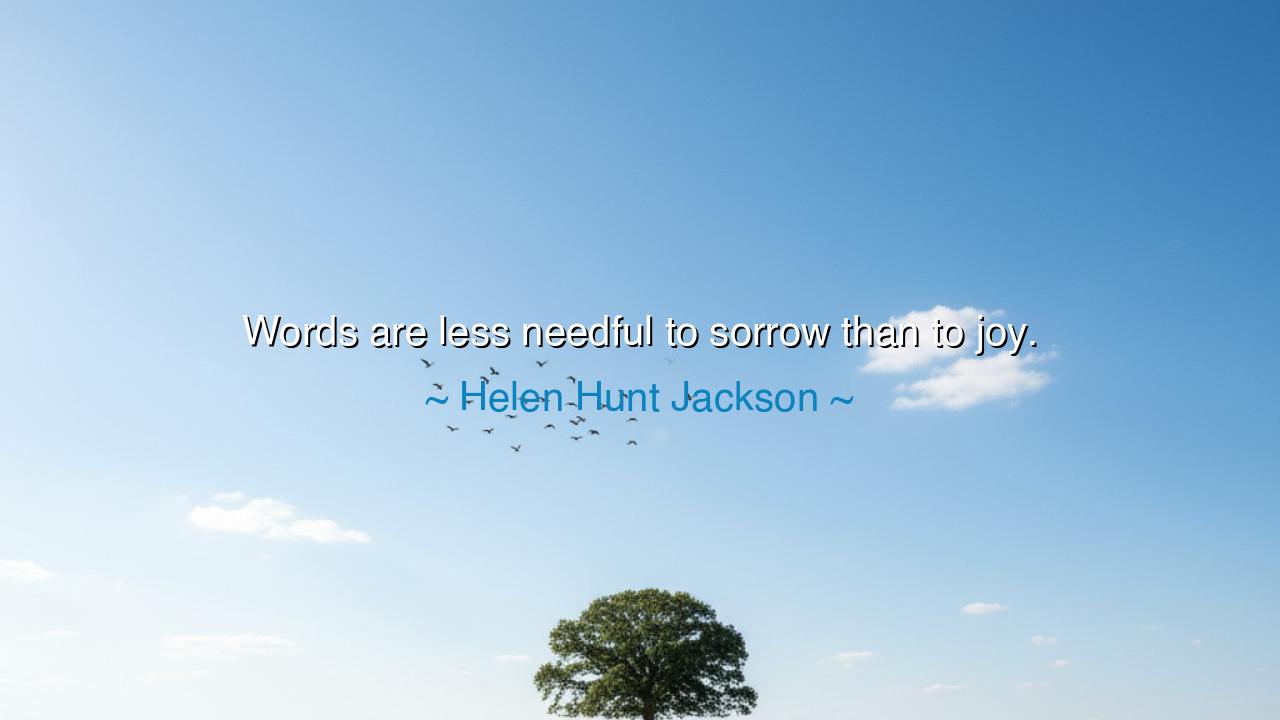
Words are less needful to sorrow than to joy.






In the delicate and mournful words of Helen Hunt Jackson, there lies a truth carved from the depths of human experience: “Words are less needful to sorrow than to joy.” This statement, quiet yet profound, reveals the essence of how emotion expresses itself within the human soul. When the heart rejoices, it overflows and seeks to share; when it grieves, it retreats inward, unable—or unwilling—to speak. Joy is expansive, generous, and vocal; sorrow is deep, solitary, and silent. Jackson’s insight captures the eternal rhythm of emotion—the way laughter calls for company, while grief seeks the stillness of solitude.
Helen Hunt Jackson, a 19th-century American poet and humanitarian, knew much of both sorrow and compassion. Her life was marked by loss—the deaths of her husband and two children before she reached middle age—and through that suffering, she gained an understanding of pain that shaped her writing. Her works, though often gentle in tone, are underpinned by a quiet strength and empathy born of endurance. When she wrote that “words are less needful to sorrow,” she was not merely speaking as a writer reflecting on language, but as a woman who had lived in the silent chambers of grief.
In the ancient world, philosophers and poets alike understood the mystery of sorrow’s silence. The Greeks, in their tragedies, often showed how those stricken by despair could barely speak—their grief reduced them to gestures and tears, for words were too small to contain such immensity. Joy, by contrast, demanded song, dance, and speech. The ancients knew that words are born of light emotions; they stumble and falter in the darkness. So too does Jackson remind us that true sorrow is not something that can be adorned with language—it is something to be borne, to be endured, to be felt in silence.
Consider the life of Abraham Lincoln, whose leadership during the American Civil War was shadowed by personal anguish. When his beloved son Willie died in the White House, Lincoln spoke little of his grief. His letters and speeches of that time reveal restraint, not because his pain was small, but because it was too vast for utterance. He channeled it instead into compassion for a divided nation. His sorrow, silent yet potent, gave depth to his character and gentleness to his wisdom. Like Lincoln, those who have suffered deeply often learn that words fail before sorrow’s immensity—that silence, when held with dignity, speaks more truly than any eloquence.
Helen Hunt Jackson knew that grief, in its nature, is sacred. To speak too much of it risks diminishing it, making it common. When one grieves, the soul draws inward, like the sea pulling back before the next great wave. Silence becomes not emptiness, but reverence—a space where the spirit gathers itself. Joy, by contrast, bursts outward like sunlight after storm, demanding witness and celebration. Thus, her words remind us that both emotions have their rightful form: joy must be shared, but sorrow must be honored in quiet.
From her reflection arises a timeless lesson: respect the silence of sorrow, in yourself and in others. When someone suffers, do not rush to fill the air with words; instead, offer presence, gentleness, and understanding. Often, comfort does not come from speech, but from stillness—from the shared quiet that says, “I am here.” And when you yourself grieve, do not feel compelled to explain or justify your pain. Let your silence be your prayer; let your tears be your language.
So remember, O listener, that words are tools of joy, but silence is the language of sorrow. Both are sacred, and both have their time. Learn to discern which is called for, and you will walk wisely among hearts both happy and broken. As Helen Hunt Jackson teaches, do not fear the silence that sorrow brings—it is the heart’s way of healing. For when the storm has passed and the spirit begins to mend, words will return—not to define grief, but to give thanks for the strength it has given you.






AAdministratorAdministrator
Welcome, honored guests. Please leave a comment, we will respond soon